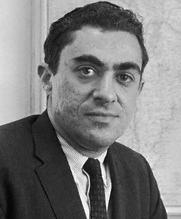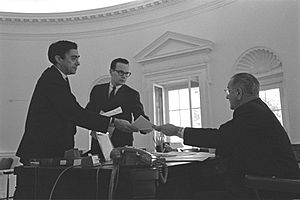Richard N. Goodwin facts for kids
Quick facts for kids
Richard N. Goodwin
|
|
|---|---|

Goodwin in 1965
|
|
| Born |
Richard Naradof Goodwin
December 7, 1931 Boston, Massachusetts, U.S.
|
| Died | May 20, 2018 (aged 86) Concord, Massachusetts, U.S.
|
| Nationality | American |
| Other names | Dick Goodwin |
| Education | Brookline High School |
| Alma mater | Harvard Law School Tufts University |
| Occupation | Writer |
| Spouse(s) |
Sandra Gail Leverant
(m. 1958; died 1972) |
| Children | 3 |
Richard Naradof Goodwin (December 7, 1931 – May 20, 2018) was an American writer and important advisor to presidents. He helped write speeches for Presidents John F. Kennedy and Lyndon B. Johnson. He also advised Senator Robert F. Kennedy. Richard Goodwin was married to the famous historian Doris Kearns Goodwin for 42 years. He passed away in 2018 at the age of 86 after a short illness.
Contents
Early Life and Education
Richard Goodwin was born in Boston, Massachusetts, on December 7, 1931. His parents were Belle and Joseph C. Goodwin. He grew up in a Jewish family.
Goodwin went to Brookline High School. In 1953, he graduated with top honors from Tufts University.
In 1954, he joined the U.S. Army. He served as a soldier in France after World War II. After his military service, he studied at Harvard Law School. He graduated in 1958 at the very top of his class. He was also the president of the Harvard Law Review, a major law journal.
Goodwin's Career in Government
Starting His Career
After law school, Goodwin worked for Justice Felix Frankfurter at the U.S. Supreme Court. This was a very important job for a young lawyer.
Later, he worked for a government committee called the House Committee on Interstate and Foreign Commerce. Here, he helped investigate the "quiz show scandals" of the 1950s. These scandals involved popular TV game shows where contestants were secretly given answers. This event was later made into the 1994 movie Quiz Show, where an actor played Richard Goodwin.
Working with President Kennedy
In 1959, Goodwin joined the team that wrote speeches for John F. Kennedy. Kennedy was running for president at the time. Goodwin was one of the youngest members of Kennedy's group of young advisors, known as the "New Frontiersmen."
After Kennedy became president in 1961, Goodwin became a special advisor to him. He focused on issues in Latin America. Later that year, he became a Deputy Assistant Secretary of State, continuing his work on relations with Latin American countries. Goodwin reportedly disagreed with the Bay of Pigs invasion, a plan to invade Cuba, and tried to convince President Kennedy not to do it.
In August 1961, Goodwin went to Uruguay with a U.S. team. They attended a meeting with finance ministers from Latin American countries. The main topic was the Alliance for Progress, a U.S. program to help Latin American countries grow. All countries agreed to the plan except Cuba.
The Cuban representative, Che Guevara, wanted to talk with Goodwin. Goodwin got permission from his boss to listen to Guevara. At a party, Guevara and Goodwin met in a private room. They joked about the Bay of Pigs invasion, which had happened a few months earlier. They understood their countries were not friends, but they talked about how to keep peace.
They unofficially agreed that if Cuba stopped military alliances with the USSR and didn't help revolutionaries in other countries, America might stop trying to remove Cuba's leader, Fidel Castro, by force. America might also lift its trade ban on Cuba. They agreed to tell only their leaders, Castro and Kennedy, about their talk.
Goodwin wrote a memo for President Kennedy about the meeting. He said he was successful in connecting with Guevara. President Kennedy was happy with Goodwin's efforts. He even smoked one of the Cuban cigars Guevara had sent to Goodwin as a gift.
In July 1962, Goodwin also helped plan for a future change in government in Brazil, which happened in 1964.
Goodwin also worked to save ancient Egyptian monuments, like the Abu Simbel temples. These monuments were in danger because of the building of the Aswan Dam.
After President Kennedy was assassinated, his wife, Jacqueline Kennedy, asked Goodwin for help. He arranged for an eternal flame to be placed at Kennedy's grave at Arlington National Cemetery.
Working with President Johnson
From 1963 to 1964, Goodwin worked for the International Peace Corps Secretariat. In 1964, he became a special assistant to President Lyndon B. Johnson.
Goodwin is known for naming Johnson's big plan for America "the Great Society." This term was first used by President Johnson in a speech in May 1964. Goodwin helped write parts of this important speech.
Goodwin also wrote speeches for President Johnson after "Bloody Sunday" in 1965. This was when civil rights marchers were violently stopped by police. Goodwin's speeches called for the passage of the Voting Rights Act, which helped protect the right to vote for all Americans. He also helped write Robert F. Kennedy's famous "ripple of hope" speech in 1966, which spoke out against apartheid (racial segregation) in South Africa.
Goodwin was also important in creating the Alliance for Progress. This was a U.S. program to help Latin American countries develop their economies.
Life After Government Work
In September 1965, Goodwin left his job at the White House. He was unhappy with the Vietnam War. Even after leaving, he sometimes wrote speeches for President Johnson.
In 1975, Time magazine reported that Goodwin had resigned because President Johnson wanted to remove people close to Robert F. Kennedy from the White House. The next year, Goodwin openly joined the movement against the Vietnam War. He wrote a book called Triumph or Tragedy, which criticized the war. He also wrote articles against the war for The New Yorker magazine, using a different name.
After leaving government, Goodwin taught at universities. He was a fellow at Wesleyan University from 1965 to 1967. He was also a visiting professor at the Massachusetts Institute of Technology in 1968.
In 1968, Goodwin briefly worked for Eugene McCarthy's presidential campaign. He managed McCarthy's campaign in the New Hampshire primary. Later, he left McCarthy's team to work for Senator Robert F. Kennedy when Kennedy decided to run for president.
Goodwin was a political editor for Rolling Stone magazine in 1974. He wrote a book about his experiences called Remembering America: A Voice from the Sixties (1988). In 2000, he helped write parts of the speech Al Gore gave after losing the presidential election.
His writings were published in The New Yorker. He also wrote many books, articles, and plays. In 2003, a theater in England produced his play The Hinge of the World. This play was about the conflict between the famous scientist Galileo Galilei and the Vatican in the 17th century. The play was later renamed Two Men of Florence and was performed in Boston in 2009.
Awards and Honors
Richard Goodwin received the Public Leadership Award from the Aspen Institute. He also received the Distinguished American Award from the John F. Kennedy Library.
Personal Life
Goodwin was married to Sandra Leverant from 1958 until she passed away in 1972. They had one son, Richard.
In 1975, he married the writer and historian Doris Kearns. They had two sons, Michael and Joseph. Richard Goodwin passed away at his home in Concord, Massachusetts, on May 20, 2018. He was 86 years old and had been battling cancer for a short time.
Images for kids
-
Goodwin in 1965 (left), with Bill Moyers and President Johnson in the Oval Office.
See also
- List of law clerks of the Supreme Court of the United States (Seat 2)
- Path to War
- Richard N. Goodwin Official Website: http://www.richardngoodwin.com/
Books by Richard Goodwin
- Goodwin, Richard N. (1998). The Hinge of the World: In Which Professor Galileo Galilei, Chief Mathematician and Philosopher to His Serene Highness the Grand Duke of Tuscany, and His Holiness Urban VIII Battle for the Soul of the World. Farrar Straus & Giroux. ISBN 0-374-17002-9. OCLC 37854192. https://archive.org/details/hingeofworldinwh00good.
- Goodwin, Richard N. (1988). Remembering America: A Voice From the Sixties. HarperCollins. ISBN 0-06-097241-6.
- Goodwin, Richard N. (1974). The American Condition. Doubleday. ISBN 0385004249.
- Goodwin, Richard N. (1992). Promises to Keep. Random House. ISBN 0-8129-2054-6. https://archive.org/details/promisestokeepca00good.




